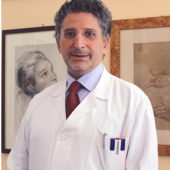Gynecologic Surgical Oncology
Milano
Via Giacomo Venezian, 1 , 20133 Milano MI

The Gynecologic Oncology Unit at the Fondazione IRCCS Istituto Nazionale dei Tumori di Milan is one of the most advanced referral centers for the diagnosis and treatment of gynecologic cancers. The Unit is recognized nationally and internationally for its high patient volume — treating over 600 patients annually — and its personalized, multidisciplinary approach that guides every phase of care.
The Unit addresses all major gynecologic malignancies: ovarian, endometrial, cervical, vulvar, and vaginal cancers, including rare and aggressive subtypes. Patients are discussed in weekly tumor boards where experts in gynecologic oncology, medical oncology, radiotherapy, radiology, pathology, and oncologic genetics collaborate to define diagnostic and therapeutic strategies, providing integrated care based on the latest scientific evidence.
The organizational model focuses on centralized care, concentrating expertise and technology in a single highly specialized structure. This results in greater clinical effectiveness, faster access to innovative therapies, and improved cancer outcomes.
Advanced Surgery and Technological Innovation
Surgery is a cornerstone of the Unit’s work, with continuous focus on innovation and technological advancement. Minimally invasive approaches — laparoscopic and robotic — are prioritized whenever possible, even for complex oncologic cases. Robotic surgery enables greater precision, reduced blood loss, shorter hospital stays, and quicker recovery. In advanced cases or recurrences, the team performs open cytoreductive surgeries and has extensive experience with multivisceral procedures.
Special emphasis is placed on the sentinel lymph node technique, now a key component in staging and personalized treatment for endometrial and cervical cancer. The Unit also develops conservative surgical techniques in selected cases to preserve fertility and reproductive function in young patients.
Artificial Intelligence and Precision Medicine
The Unit is progressively integrating artificial intelligence (AI) into diagnostic and therapeutic pathways. AI systems are used to enhance the interpretation of radiological and histopathological images, build predictive models for treatment response, and optimize risk stratification. The goal is to strengthen clinical decision-making, personalize care, and enable early detection of recurrences.
In surgery, AI is being tested for intraoperative support through algorithms that assist in defining resection margins or locating lesions that are difficult to visualize. System-wide integration of AI, genetics, and clinical data further supports precision medicine.
Clinical and Translational Research
Research is a fundamental aspect of the Unit’s mission. Professionals are involved in numerous scientific projects, with a special focus on translational research bridging the laboratory and the clinic. Main areas of interest include:
- Molecular characterization of gynecologic tumors, with emphasis on rare cancers such as clear cell endometrial carcinoma.
- Development of biomarkers to predict treatment response and prognosis.
- Evaluation of the impact of new surgical techniques on cancer outcomes and quality of life.
- Optimization of integrated therapeutic protocols (surgery, chemotherapy, targeted therapy, immunotherapy).
The Unit participates in multiple national and international multicenter clinical trials and is actively involved in leading gynecologic oncology research networks, including ESGO, ENGOT, IGCS, MANGO, and EORTC.
Eugenia Project and Screening Models
A key collaboration is the Eugenia Project (www.progettoeugenia.it), a national initiative aimed at improving care for ovarian cancer patients. The project promotes an integrated approach including molecular tumor profiling, patient empowerment, and access to innovative therapies. Eugenia has strengthened personalized care pathways and improved patient–team interaction, with a patient-centered care model.
The Unit is also actively developing ovarian cancer screening models — critical because ovarian cancer is one of the deadliest gynecologic cancers due to late diagnosis. Research focuses on early biomarkers, advanced imaging, and active surveillance for high-risk women (BRCA, Lynch syndrome), in close collaboration with oncologic genetics services.
Patient-Centered Care and Empowerment
A hallmark of the Unit’s approach is patient-centered care. Patients are supported throughout diagnosis and treatment by a multidisciplinary team, with psychologists, nutritionists, physiotherapists, and dedicated nursing staff. Patient empowerment is promoted so that each woman can actively participate in decisions about her health, understand treatment options, and know the goals of care.
The Unit is also involved in oncologic rehabilitation and personalized follow-up programs, addressing not only clinical aspects but also psychosocial, sexual, and occupational needs, aiming for long-term well-being.
Collaboration, Training, and Outreach
The Gynecologic Oncology Unit collaborates with many academic, clinical, and research institutions nationally and internationally, including:
- The laboratories of Fondazione IRCCS Istituto Nazionale dei Tumori di Milano, for joint genomics, epigenetics, and immuno-oncology projects.
- The University of Milan and other Italian universities for teaching, thesis supervision, and residency training.
- Italian oncology hospitals and IRCCSs for collaborative networks and multicenter studies.
- European and global organizations promoting translational research, care standardization, and access to innovative treatments.
Unit members are active in teaching and outreach, speak at international conferences, and publish high-impact scientific articles.
First and follow-up visits are available daily.
Appointments can be booked:
- By calling the Institute’s Central Booking Office at (+39) 02 23901 (8:30 am–4:00 pm, Monday to Friday)
- By emailing segreteria.ginecologia@istitutotumori.mi.it
For any booking (including by phone), a health card, tax code, and a prescription for a “First general surgical consultation” are required.
For in-person or telemedicine follow-up visits, please contact the Central Booking Office during the indicated hours with an electronic referral.
Clinic visits take place in Block F, floor –1, rooms A, B, E, Z.
- Tel: 0223902728
Visiting hours for inpatients: every day from 1:00 PM to 3:00 PM
Access hours for scientific representatives: to book an appointment, write to segreteria.ginecologia@istitutotumori.mi.it or directly to the referring doctor.
Prof. Raspagliesi Francesco
Direttore struttura
Prof. Bogani Giorgio
Medical Director
Dott. Sorrentino Luca
Medical Director
Dott.ssa Mantiero Mara
Medical Director
Dott.ssa Chiappa Valentina
Medical Director
Dott.ssa Bini Marta
Medical Director
Dirigenti Medici:
Dr. Simone BRUNI
Dr. Lorenzo CEPPI
Dr.ssa Maggie POLIGNANO
Dr.ssa Monika DUCCESCHI
Dr. Umberto LEONE
Dr.ssa Simona PALLADINO
Dr.ssa Lucia ZANCHI
Coordinatrice infermieristica: Dott.ssa Eliana SCIARAFFA
Harnessing Altered Choline Metabolism To Hinder Chemoresistance And Aggressiveness Of Ovarian Cancer
Last update: 17/09/2025
